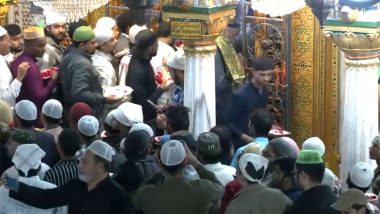New Delhi, February 26: Muslims across the country celebrated the 'Shab-e-Baraat', also known as the 'night of forgiveness', a significant festival observed on the 14th and 15th night of Sha'aban, the eighth month in the Islamic calendar on Sunday. The Shahi Imam of Delhi's Jama Masjid, Syed Ahmed Bukhari on Sunday declared his son as his successor in a 'dastarbandi' ceremony held at the courtyard of the grand mosque.
The ceremony involves tying a 'dastarbandi (turban)' on the head of the next Imam, following with the prayers. Syed Ahmed Bukhari said, "This is the night of prayer. It's the night of forgiveness from sins. Everyone should pray in silence and later everyone should go to their homes." Shab-e-Barat 2023 Date in India and Saudi Arabia: Know History and Significance of 'Night of Forgiveness' Ahead of Holy Ramadan Month.
Shab-e-Barat Being Observed at Nizamuddin Darga
#WATCH | Shab-e-Barat being observed at Nizamuddin Darga, in Delhi. pic.twitter.com/9HLOq1mM8Y
— ANI (@ANI) February 25, 2024
Shab-e-Barat celebrations were observed at Nizamuddin Darga, in Delhi. People were seen in large numbers surrounding the Holy Dargah with their prayers. Delhi Police officials arranged various check posts around the National Capital to maintain law and order in awe of the Shab-e-Baraat celebrations.
Srinagar's Dargah Hazratbal Shrine was decorated with lights and people gathered there in large numbers. People also arrived at the 'Bada Qabristaan' in Mumbai to pray for their relatives who passed away.
Shab-e-Baraat 2024
Shoaib Khatib, Trustee of Jumma Masjid in Mumbai said, "Bada Qabristaan in Mumbai has a history of 200 years. It is spread over 8 acres. People of those who have passed away come here and pray for them. Mumbai Police has made wonderful arrangements. Whatever guidelines were made, everyone followed them. People who come here also worship peacefully. The Masjid Trust makes arrangements a month before the Shab-e-Baraat." Shab-e-Barat 2023 Date in UAE: When Will Barat Night Fall in the United Arab Emirates? Know History and Significance of 'Night of Forgiveness' Ahead of Holy Ramadan Month.
People sat and listened to the religious hymns at Uttar Pradesh's Aligarh. The word 'Shab' has Persian origins, meaning night, while 'Barat' is an Arabic word that stands for salvation and forgiveness. On the night of Shab-e-Barat, Muslims worldwide ask for forgiveness for their sins from Allah.
This festival is marked with great enthusiasm across South Asia, including countries like India, Pakistan, Bangladesh, Sri Lanka, Azerbaijan, Turkey, and Central Asian countries such as Uzbekistan, Tajikistan, Kazakhstan, Turkmenistan, and Kyrgyzstan.
Many believe that this is a holy night when Allah is more forgiving and that sincere prayers can help wash away their sins. The night is also used to seek mercy for deceased and ill family members, and it is believed that Allah decides people's fortune for the year ahead, their sustenance, and whether they will have the opportunity to perform Hajj (pilgrimage).
Further, Shab-e-Barat has its unique traditions, depending on cultural diversity and local traditions. During the day, Muslims prepare delicious sweets like Halwa, Zarda, and other delicacies to distribute among their neighbors, relatives, family members, and the poor. Many visit the graves of their loved ones to pray for eternal peace for their souls. Some also observe a fast on Shab-e-Barat.
Mosques are decorated, and many of them have periodic recitations and announcements throughout the day, before preparing for the main events of the night. After sundown, Muslim devotees start their prayers with 'Isha Ki Namaz' and continue the prayer session throughout the night till the next day before eating Sehri, a pre-dawn meal before the fast for Shab-e-Barat.
(The above story is verified and authored by ANI staff, ANI is South Asia's leading multimedia news agency with over 100 bureaus in India, South Asia and across the globe. ANI brings the latest news on Politics and Current Affairs in India & around the World, Sports, Health, Fitness, Entertainment, & News. The views appearing in the above post do not reflect the opinions of LatestLY)













 Quickly
Quickly


